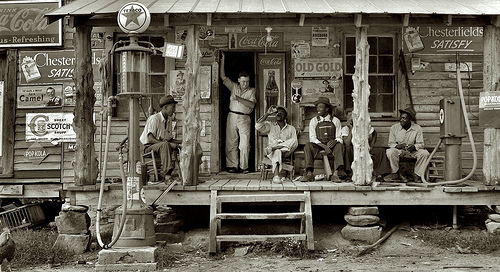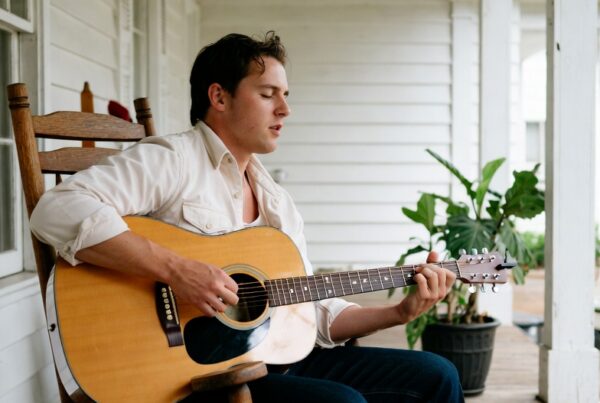Originally published in the March 1998 issue of Reason magazine.
Local busybodies target the front porch.
In the small-town American South porch sitting was once a nearly universal pastime. As a place for sipping tea or Co’ Cola, smoking or dipping, telling stories, courting, and watching lightning bugs, the front porch was unsurpassed. Southern porches have been celebrated in song (“Swingin’” and “My Tennessee Mountain Home,” to name just two country music examples) and story (Zora Neale Hurston: “It was the time for sitting on porches beside the road. It was the time to hear things and talk.”). James Agee wrote about a porch in A Death in the Family (Samuel Barber set his words to music in “Knoxville: Summer of 1915”), and who can forget Faulkner’s Greek chorus of neighborhood men, sitting on the Bundrens’ porch in As I Lay Dying? A recent book on black Southern storytelling is fittingly titled The Power of the Porch.
Sure, the actual activity of porch sitting (if activity is the word for it) has largely succumbed to the assaults of air conditioning, cable television, and migrants from places with cold evenings. Many new Southern homes substitute a solipsistic deck out back for the traditional front porch. But Southerners are still nostalgically attached to porches as icons of old-timey leisure and sociability, and they crop up in unlikely places. Durham, North Carolina’s alternative newspaper, for instance, heavily into things like healing crystals, opens each issue with a section called “The Front Porch.” One of the Charlotte airport’s interminable corridors displays photographs of Charlotteans sitting on their porches. And new, planned, neotraditionalist developments like north Florida’s Seaside have reintroduced porches in a hopeful attempt to build community. Yes, we take our porches seriously down here.
So when the Appearance Committee of Wilson, North Carolina, a small town in the eastern part of the state, decided to do something about how the place looked, it was no surprise that they started with the town’s front porches. It was no surprise either that when they proposed a ban on upholstered furniture they ran into some resistance from folks who like their porches just the way they are.
The committee came up with some lame excuses about eliminating breeding places for rats and fleas, but the real objection was that the stuff just looks so trashy. As committee member Sarah Rasino told The Charlotte Observer, “Upholstered furniture exposed to the elements becomes waterlogged, deteriorates, and the stuffing falls out. Homes that have upholstered surfaces on porches tend to have trash in the yard, too. It goes hand in hand.”
There’s a class angle to this, of course. Like much of the South’s traditional culture, porch sitting survives in its least self-conscious form among poor and working-class folk, black and white. It isn’t the country-club set, after all, who enjoy waving as the cars go by. Moreover, these are the same folks who often can’t afford air conditioning or cable TV. The problem, as the Appearance Committee sees it, is that they often can’t afford decent-looking porch furniture either—or at least that they see no reason why they shouldn’t furnish their porches with beat-up old sofas or recliners that have outlived their usefulness in the living room.
To Wilson’s embarrassment, the smart-ass metropolitan newspapers had a lot of fun with this story, and some of my academic colleagues played along. Emory University historian Dan Carter lamented in The New York Times what he saw as “the ultimate yuppiefication of the South,” adding tongue-in-cheek that “there’s nothing more inviting than an old front seat from a 1957 Chevrolet sitting on a front porch.” Charles Reagan Wilson of the University of Mississippi told The Charlotte Observer that the proposal was “an outrage,” a violation of the Southern “idea of the outdoors as a livable space.” He invoked Dolly Parton and the memory of Elvis Presley, and groused, “Next thing, they’ll ban pink flamingos in front yards.”
But for all the talk of ratty porch furniture as a regional tradition, what the Appearance Committee really threatens is a different Southern tradition altogether, one that W. J. Cash wrote about in The Mind of the South nearly 60 years ago: the region’s “intense individualism.” In the Old South, Cash argued, this trait was found not just in the Southern planter, “wholly content with his autonomy and jealously guardful that nothing should encroach upon it,” but also among “the farmers and the crackers [who] were in their own way self-sufficient, too—as fiercely careful of their prerogatives of ownership, as jealous of their sway over their puny domains, as the grandest lord.” Decades later, Cash wrote, Southerners still saw the world “as, in its last aspect, a simple solution, an aggregation of selfcontained and self-sufficient monads, each of whom was ultimately and completely responsible for himself.” And the “ruling element” in this tradition was “an intense distrust of, and, indeed, downright aversion to, any actual exercise of authority beyond the barest minimum essential to the existence of the social organism.”
This down-home libertarianism is still with us, celebrated in dozens of country songs by singers like Hank Williams Jr., Charlie Daniels, Bobby Bare, Merle Haggard, and David Allan Coe. In 1976, journalist Roy Reed described it for readers of The New York Times. The South, he wrote, is “given [its] dominant tone by men— and women who acquiesce in this matter—who carry in their hearts or genes or livers or lights an ancient, God-credited belief that a man has a right to do as he pleases. A right to be let alone in whatever plain of triumph he has staked out and won for his own. A right to go to hell or climb to the stars or sit still and do nothing, just as he damn well pleases, without restraint from anybody else and most assuredly without interference from any government anywhere… .It is no accident that the most determined holdouts against land-use legislation in the United States are country people from the South. They will take care of their own land, and let the next man take care of his. If the next man puts in a rendering plant or a junkyard, that is his business.”
Reed argued that this is yet another Lost Cause, lost “about the time [a man] lost the irretrievable right to take a leak off his own front porch” (a porch activity I forgot to mention). But, he wrote, “they have not yet taken [Southerners’] right to curse and defy.”
And that’s about the size of it in Wilson. Last I heard, there was a whole lot of cursing and defying going on, but the appearance commissars seemed determined to stick to their guns. And that’s a shame. Although I actually sympathize with their motives (I live in a neighborhood full of university students), something more important than appearances is at stake here. If a man can’t choose his own damn porch furniture, what the hell can he choose?
I say they can have my La-Z-Boy when they pry it from my cold dead fingers.







Here in SE virginia a few years ago, my rural county told me I was breaking the law by having a simple “camp out,” even if only one night, unless I applied for and was granted a $1,350.00 commercial campground permit from the county! How tyrannical is that!
This was on our 86 acre farm!
I’ve enjoyed John Shelton Reed’s work for almost 25 years, since first hearing him speak while he was supporting his excellent book 1001 Things Everyone Should Know About The South. I have a small collection of his books and find even his older work, as here, as insightful, humorous and relevant as ever. More, please!